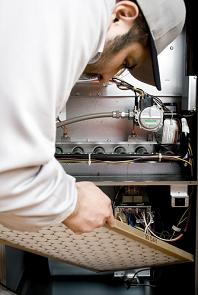
Role of an Air Filter
Air filters are responsible for filtering out airborne particles, including dust, debris and mold, before they're able to enter into the HVAC system and settle on the delicate machinery. The air filter also ensures maximum airflow throughout the home, as it prevents particles from building up within the home's air ducts. Without a clean air filter, this buildup would ultimately lead to a decrease in air pressure, limiting the system's heating and cooling capabilities.
The Importance of Replacing Air Filters
Homeowners should change their HVAC system's air filter on a regular basis. A dirty air filter not only inhibits system performance, but it could also expose your family to harmful mold spores. Since mold thrives in a wet environment, mold growth can occur quickly if a dirty filter becomes damp due to factors such as condensation.
When air filtration is compromised, an HVAC system is forced to work harder when circulating air throughout a home. This can cause unnecessary stress and strain on the system's mechanical components, eventually leading to premature system failure and leaving the Massachusetts homeowner stuck with costly repairs.
Changing the Air Filter
A standard rule of thumb is to replace an air filter once every three months. For your own safety, start by turning off the unit before removing the current filter. The filter's frame should then be cleaned, using a damp rag, to remove any dust that's accumulated. Take note of the new filter's color-coded sides so that it's installed facing the right direction. Write down the date when changing the filter to serve as an easy reminder.
Rodenhiser Plumbing, Heating & Air Conditioning provides Massachusetts residents with professional HVAC services. Proudly serving the Route 495/128 area,we can be contacted 24/7 for emergency or routine maintenance and services.
Image via Shutterstock.com